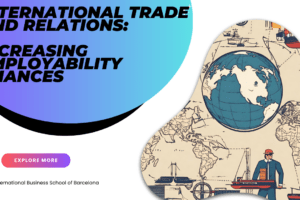
International relations and business: A fascinating subject to study in 2018

Anyone reading recent headlines will see that the rumblings of international discontent are louder than usual. With a U.S. president bent on an international trade war and Brexit looming on the horizon, it’s a good time to consider the position of businesses as they seek to grow.
Let’s look at some important changes in national policies, speculate on the outcomes and examine how some companies – Facebook and Uber in particular – have come a cropper in recent months, thanks to underhanded policies and poor global strategy.
National decisions with international consequences
Changes in policy, trade laws and import taxes in any one country can all have an impact on economies and businesses around the world. Both the U.S. and the U.K. are on the brink of some major adjustments and there is a lot of analysis and commentary in the media as a result.
USA against the world
Trump recently announced that he would be levying an extra $50 billion in import tarifs on a wide range of imported Chinese goods in the U.S., marking the beginnings of a possible trade war.
While Trump talks in terms of “winning” and “losing”, the truth is that it will have complex and unintended effects.
Aside from the obvious impact on China and the U.S. itself, Australia and Japan are also likely to feel the weight of Trump’s decision. According to the South China Morning Post, the additional tariffs will affect the Australian dollar. This is partly because approximately 30 percent of the country’s goods and services are exported to China.
The article also suggests that the yen will strengthen as traders seek a safe haven currency, causing trouble for Japan’s export industry as a result.
In both Australia and Japan, multinationals and the companies that supply them will need to take this into account as the situation develops.
UK against Europe
Britain’s seismic shift came on June 23rd 2016 when the country voted in a referendum to leave the European Union. But far from just a domestic policy issue, the aftershocks of the decision have been travelling around the world ever since.
Last year, the Bank of England forecast some positive outcomes, but also said that by 2020, the level of investment in the UK economy is likely to be 20 percent below what was forecast before the British people decided to leave the union.
Primarily, this depends the fate of the British pound, which itself rests on market speculation on the outcome of the country’s negotiations with Europe and future trade agreements outside the trading block.
A possible Brexit business outcome
If the value of the pound was to permanently fall, one effect, for example, could be that the number of tourists coming to the country rises, thanks to increased spending power.
Britain would see growth in the service industry with more hotels, restaurants and tour companies. As a result, town councils would perhaps invest taxes more heavily in infrastructure to encourage visitors. There would be improvements in local economies, but also more gentrification and the marginalisation of poorer communities.
We would also possibly see a boom of international travel tech startups like Airbnb looking to grab some extra market share, in turn increasing VC investment in startups in Silicon Roundabout and beyond.
While a certain number of jobs in tourism would be created in the UK and abroad, it wouldn’t all be rosy. A weaker pound could also reduce the number of outbound tourists who are receiving less bang for their buck.
Travel companies and airlines would either try to encourage leisure travel by lowering the costs of their flights and lodgings, raise prices where possible to offset the difference, or simply cut services. Business travellers would initially see a hike in travel costs as airlines try to squeeze what they can from those who have no choice but to fly.
On the ground, companies would potentially react by redirecting travel budgets and investing in better software and platforms for remote work and meetings. This would perhaps even bolster R&D in virtual reality and augmented reality B2B platforms.
Of course, this is pure speculation; there are too many considerations for one model to take into account and too many outside forces to factor in to be accurate. Nevertheless, entrepreneurs need to speculate and companies need to assess risks.
At the company level
Things can be just as involved at a company level, especially when international growth happens rapidly and without much forethought.
Take car-sharing platform Uber’s global expansion for example. Not only must the company compete with a mounting number of competing local startups, but it must also navigate the laws of each nation it enters and understand the obligations it has to its drivers.
As a result, it has faced several big challenges over the past few years. It has been banned in London, designated as a taxi firm in Europe (after being told to obey local taxi rules in Barcelona) and is even facing violent opposition from taxi drivers around the world.
Facebook is not faring much better. The company has been heavily criticised for the spread of Fake News – a propaganda technique used in elections – and also for allegedly failing to report a massive data breach in the Cambridge Analytica scandal.
The company has also recently apologised for its invasive data collection. In the build up to GDPR, the new European-wide data protection regulation, it has an extremely large liability on its hands.
While startups like these make up the vanguard of tech advancement, without the right safeguards and strategies in place, they are at risk of misuse, hacking scandals and even illegal electioneering.
Global vision requires a deep understanding of the threats involved in international market penetration.
What studying international relations at ESEI means for you
In studying international relations and business at ESEI you gain the skills and strategies needed to analyse and understand big picture economics.
By learning how to examine domestic and international growth, the labour market, exchange rates and the intricacies of international trade policies, you furnish yourself with an invaluable tool kit.
Consultants with the ability to read and react quickly to changes and recommend the right strategies are highly sought after; even more so today when multinational companies are facing huge amounts of uncertainty in the global market.
Make yourself an indispensable part of a major multinational or help a growing startup find its way in the world and take the Master in International Relations and International Business at ESEI.



